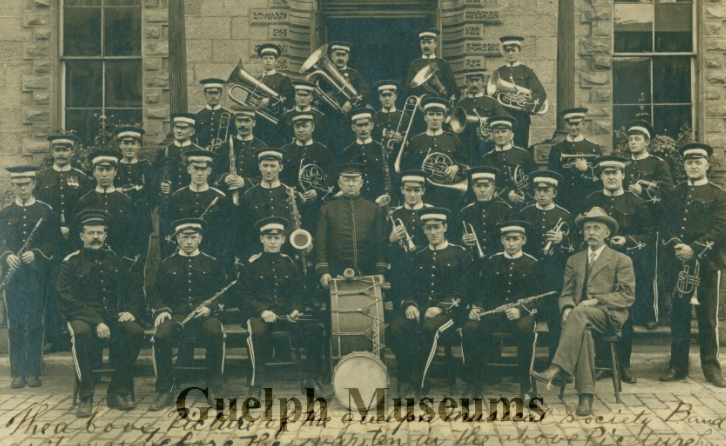In July 1917, a Toronto correspondent for the New York musical publication Metronome wrote that one of the best bands in Canada was that of the Guelph Musical Society. He had special praise for its conductor, professor William Philp, a man who had devoted his life to music.
Philp was born in Cobourg in what was then Canada West in 1841, and was drawn to music at an early age. He was still in his teens when he was appointed bandmaster with a militia unit, the 57th Rangers of Peterborough. He then taught music at Trinity College School in Port Hope, where he also conducted the Durham 46th Regiment Band.
Band music was one of the most popular forms of entertainment in Victorian Canada, particularly in small towns. Communities took great pride in their local bands, and competition for prestige and cash prizes was stiff. Philp first visited Guelph in 1876 when he arrived with the 46th for a competition. He liked the town so much he accepted an offer to be choirmaster at Dublin St. Methodist Church. He organized the Guelph Choral Union, and in 1878 was appointed bandmaster of Guelph’s combined city and Artillery Brigade bands.
At a competition in London, Ontario, in 1879, the Guelph band came in second, but a cornet soloist named John Scoon who had been trained by Philp took first prize. He beat a musician who’d been considered the best in Canada.
Exceptional bandmasters and music teachers like Philp could use the honorific “professor.” But the impressive-sounding title didn’t mean they were well-paid. Philp received a stipend from the city for his work, but like most of his colleagues he had to find ways to supplement his income. He played the organ in churches and gave private lessons on a variety of instruments. He was also an agent dealing in the sale of sheet music and instruments.
In 1863 Philp married Henrietta Sweeten. They had six sons and five daughters. Henrietta died in 1885, and soon after Philp married Mary Elizabeth Leadly, who was 33 years his junior.
The Artillery Brigade part of the Guelph band was dissolved in 1882, possibly for political reasons. That year Philp and his family moved to Sarnia where he taught music at the Normal School (teachers’ college), and directed the 27th St. Clair Borderers Band. He was also instructor for the Maccabees band of Port Huron. Philp’s son Herbert was born in Sarnia in 1889. Two more children, Norman and Helen, would follow.
A “professor” of music led an itinerant lifestyle. Over the next few years the Philps lived in Chatham, Westminster, London, Winnipeg, Waterloo and Elmira. They even resided for a while in Charlottesville, Virginia. Philp’s older children had reached adulthood and some evidently remained in Guelph. The parents and younger children might have resided with one of them when they returned to Guelph, possibly as early as 1896. Herbert, and quite likely Norman and Helen, attended the Guelph Collegiate Institute. In 1910, Philp became bandmaster for the Guelph Musical Society.
Two of Philp’s sons played in the band; Herbert on trumpet and cornet, and Norman on the clarinet. Both young men enlisted to fight in the Great War of 1914-18.
Herbert, who served as a trumpeter and signaller, was a professional journalist. He wrote many detailed letters about life at the front which his parents had published in the Mercury. Not surprisingly, Herbert was very much involved with regimental bands. William sent him some music of his own composition, and Herbert wrote that the performances were well-received by the officers and troops.
Under Philp’s direction, the Guelph Musical Society Band did its patriotic duty by holding concerts in Exhibition Park and participating in parades to encourage enlistment and raise funds for the war effort and the Red Cross. Several Musical Society bandsmen followed the Philp brothers into the army.
Both brothers came home from the war, but Herbert’s health was ruined. He died from heart disease in 1920 at age 30. William’s health was already failing, and his son’s death was certainly a blow. Nonetheless, he directed the Musical Society band for two more years.
Professor Philp died at his Northumberland St. home on June 30, 1925, at age 83. The Toronto Globe obituary noted that he was “one of the most talented musicians of his day.”



